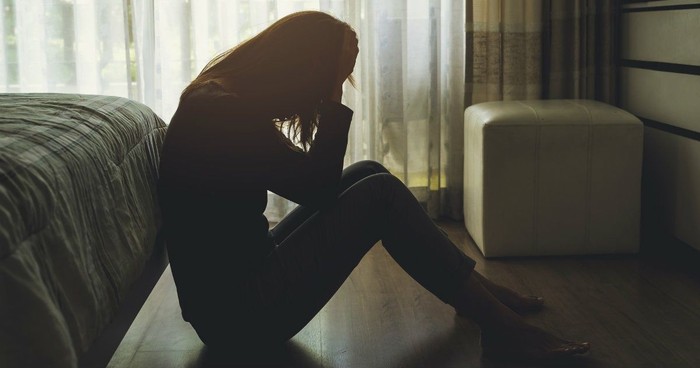
While squealing kids play and chattering women prepare a holiday feast, one exhausted mother stands quietly at the edge of the room. She knows she should be introducing herself to new faces, extending her hand first and making friends. But she’s frozen, paralyzed almost. Overwhelmed by the feeling that she’s sinking, her heart races and threatens to pulse out of her chest. Everything in her body wants to run out the door behind her, run until she can finally breathe again.
“Maybe I can blame it on my kids,” she wonders. “But they’re having the time of their lives; I can’t do that to them. If I could just get back home. I just need to catch my breath. I just need to get out of here!”
Her fight or flight instincts kick in, and she struggles to convince herself not to run. Determined to ride out this crashing wave discretely and politely, she forces a smile and tries to just keep breathing. But the mental fog has set in, stealing all clarity of thought and making the words for small-talk impossible to find.
Finally, the hostess calls everyone to the table and the tired momma focuses on feeding her kids. When the meal ends, she slips off to the bathroom. Alone at last, the tears spill over. But she can’t let herself break down. Not here, not now. Instead, she quickly dries her eyes and returns to attempt socializing, all the while wondering if it’s acceptable yet to leave.
That burnt-out momma? She’s more than just tired. She’s suffering from an anxiety disorder, and she is me.
The scene I’ve just described happened yesterday. Everyone at the dinner was friendly as could be, and the evening was set up to be a delightful time shared with friends.
But my anxiety had already been triggered before I ever stepped foot in the door and, despite all the logic in the world, my body was responding in crisis mode.
This is nothing new. I have felt debilitating anxiety ever since I was a child. For most of my life, I didn’t know what to call it. I didn’t like the word anxiety because to me that represented something I could control. When I felt overcome by anxiousness, I believed it was a weakness. A flaw. A sign that I didn’t have enough faith. A sin. But an illness? I didn’t even know that was a thing.
So I tried to pray my way out of it. I tried to reason my way out of it. I tried forcing myself to do things in spite of my fears, and I tried to maintain a positive mindset in all circumstances. But the anxiety persisted.
Meanwhile, I heard well-meaning people say things like,
“Stop assuming the worst-case scenario.”
“You must just be focusing on the negative.”
“Don’t you know the Bible says not to worry?”
“Everything is fine, why are you freaking out?”
“What is it? You’re so quiet. Speak up. Spit it out. Use your words.”
All the while I wanted to scream. If only they knew! If only I could get those words out and explain the crushing weight of being so misunderstood. But the words never came out in the moment because I was frozen, trapped in a fog, and trying to find my way back out.
Over time, I learned to suppress the anxiousness and I numbed out when it became too overpowering. But eventually my mental health hit rock bottom, and I sought professional help (only by then it was also for a severe eating disorder and major depression).
More than a decade after first seeking help, my life has improved tremendously. But I am not immune. Seasons of intense stress, postpartum anxiety, hormonal imbalances, sleep deprivation, and other factors can still trigger my anxiety disorder and cause me to experience moments like yesterday. Moments when I feel held hostage by a malfunctioning brain and body.
In those moments, even when I consciously choose to redirect my thoughts from worry, my body still experiences physiologically symptoms of panic. Even when I choose to place my faith and trust in God, biological triggers leave me chemically imbalanced and on edge. Even when I know my fears are illogical, they still become debilitating.
When these triggering seasons hit, I am left with a choice. Do I pretend I’m fine and struggle to manage things on my own? Or do I swallow my pride, seek professional help, and address the disorder in its entirety?
I am not perfect, and sometimes it takes me far too long to acknowledge that I need help. But when I finally give in and reach out for help, it makes all the difference in the world!
Unfortunately, far too many people do not receive the level of care they need because they either don’t know that what they’re experiencing is classified as a mental illness, they feel too ashamed to seek help, or they think it’s strictly a spiritual issue.
By sharing my story with you, I hope those of you who are suffering will acknowledge the reality of your struggles, set aside any shame or embarrassment you may feel, and call your doctor today.
Anxiety disorders are not a choice. They are not a sign of weakness. They are clinical mental illnesses with a complex combination of causes, and they are best treated by trained professionals. While addressing the spiritual side can certainly be helpful, it is important to look at the person and illness from all sides (physically, mentally, emotionally, and spiritually), and customize treatment around the individual’s specific needs.
What Is an Anxiety Disorder?
Anxiety disorders are one of the most common forms of mental illness, affecting an estimated 40 million adults in America alone. While there are multiple types of anxiety disorders, Generalized Anxiety Disorder (GAD) is one of the most common and it is what I struggle with the most. According to the Mayo Clinic’s website, GAD presents itself with the following symptoms:
- Persistent worrying or anxiety about a number of areas that are out of proportion to the impact of the events
- Overthinking plans and solutions to all possible worst-case outcomes
- Perceiving situations and events as threatening, even when they aren't
- Difficulty handling uncertainty
- Indecisiveness and fear of making the wrong decision
- Inability to set aside or let go of a worry
- Inability to relax, feeling restless, and feeling keyed up or on edge
- Difficulty concentrating, or the feeling that your mind "goes blank"
- Feeling anxious for no apparent reason
- Fatigue
- Trouble sleeping
- Muscle tension or muscle aches
- Trembling, feeling twitchy
- Nervousness or being easily startled
- Sweating
- Nausea, diarrhea or irritable bowel syndrome
- Irritability
The Mayo Clinic also points out that children or teens with Generalized Anxiety Disorder may:
- Feel overly anxious to fit in
- Be a perfectionist
- Redo tasks because they aren't perfect the first time
- Spend excessive time doing homework
- Lack confidence
- Strive for approval
- Require a lot of reassurance about performance
- Have frequent stomachaches or other physical complaints
- Avoid going to school or avoid social situations
According to the Mayo Clinic, children and teens with GAD may also experience excessive worry about:
- Performance at school or sporting events
- Family members' safety
- Being on time (punctuality)
- Earthquakes, nuclear war, or other catastrophic events
If you suffer silently from persistent anxiety, please seek help today. Mental illnesses do not discriminate. They affect people of all races, professions, genders, ages, and religions. Suffering with anxiety is not a reflection of your strength, faith, or character. There are real reasons for your struggles, and trained professionals are waiting to walk you through this journey. Your life matters. Call your doctor today.
Image Credit: Thinkstock.com








